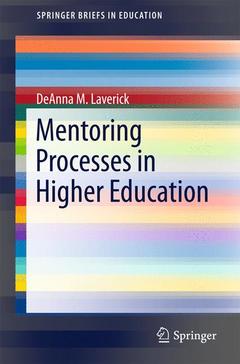Mentoring Processes in Higher Education, 1st ed. 2016 SpringerBriefs in Education Series
Auteur : Laverick DeAnna M.

Includes specific and practical examples that provide models for strong mentoring programs
Is well-rounded in considering many important aspects of mentoring in the university setting
Emphasizes unique aspects of mentoring in a variety of situations and environments
Provides a resource for students, faculty, and professional colleagues at different career stages
Includes supplementary material: sn.pub/extras
Date de parution : 06-2016
Ouvrage de 84 p.
15.5x23.5 cm
Thèmes de Mentoring Processes in Higher Education :
Mots-clés :
coursework and curriculum development; field experiences in teaching and internships; mentoring in living--learning communities; mentoring through co-teaching; mentoring female students; professional mentoring development activities; minoritized racial and ethnic groups; mentoring in student organizations; mentoring new faculty; peer mentoring; mentoring graduate students; mentoring undergraduate students; mentoring female faculty; mentoring programs; mentoring relationships; mentoring in higher education; lear
